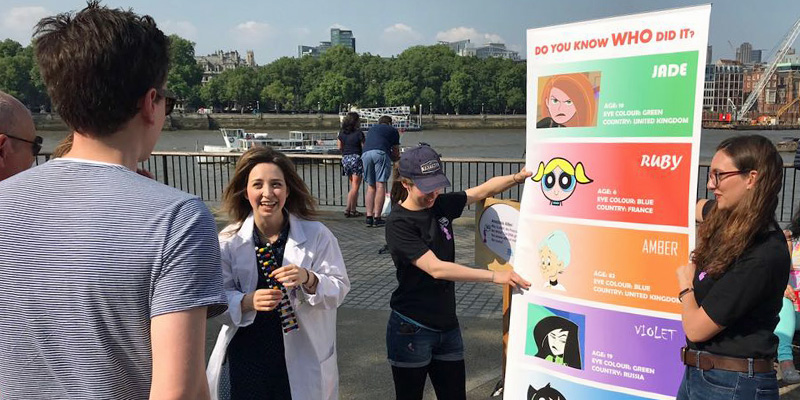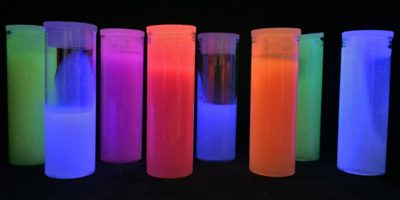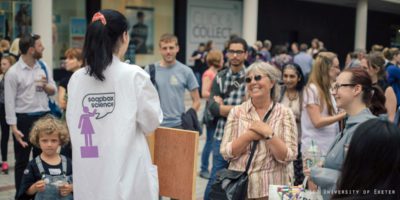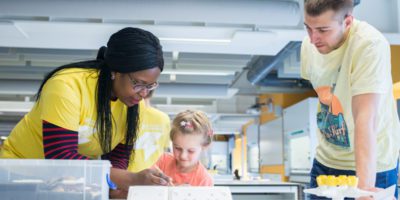Anastasia Aliferi is a Ph.D. candidate in forensic genetics, who is working on her research project within the King’s Forensics group at King’s College London. Having previously studied biology and forensic science, her current research focuses on finding a way to predict someone’s age from DNA material that can be found at a crime scene. She is also involved in similar projects on predicting someone’s country of origin and external appearance.
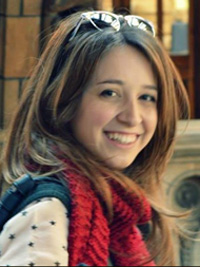
Anastasia took part in Soapbox Science London on 26th May. The title of her talk was: “Miss Scarlett, Mrs Peacock or Mrs White? Can DNA give us the answer without visiting all the rooms?”
Biologists stole my heart
I think my story starts with an annoying little girl that had too many questions and was lucky enough to fall into the hands of some amazing teachers that were there to answer them! And whilst I owe so much to inspiring people teaching all kinds of subjects, it was the biologists that stole my heart.
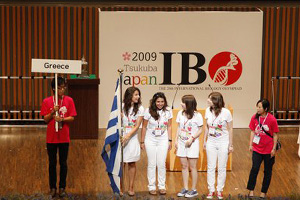
It was one of those biology teachers that during my final year enrolled me in the Greek Biology Olympiad and, three rounds of exams later, I landed in the national team that would later participate in the International Biology Olympiad in Japan. After that there was no turning back!
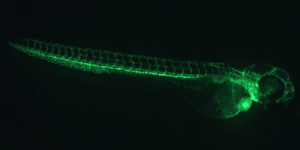
During my bachelor’s degree in biology I took up volunteering (go sea turtles!) and an internship at a developmental biology laboratory working with zebrafish. (Have you heard of glowing fish? Imagine a room full of them!). But when the time came to look for a master’s degree, with two years of lab experience behind me already, I decided it was time to mix it up a little.
In a different country, with a different language, I stepped away from basic research and into applied science in the field of forensics, where I was lucky once again to meet some pretty amazing people and get involved in a project that I absolutely loved! Combining good old-fashioned research, a novel approach and real-life applications, this project was a dream come true!
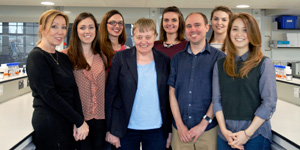
Naturally, I was not willing to give all this up after I completed my degree (there might have been an overly dramatic speech involved..!) and when my supervisors created an opening (and funding!) for me to do a Ph.D. I jumped right in. Today, in my second year of Ph.D., I am happy to say that I am as excited as ever about both the project and the great people I get to work with!
Working on real-life cases to help real people
I am a full time research student, so my time is mainly shared between lab work (picture a lab coat, gloves, lots of tubes and machines!), data analysis (which includes more statistics than I thought I would ever come close to learning) and, of course, writing (articles, presentations, abstracts, reviews … we have them all!)
Additionally, since I am lucky enough to work in a laboratory that also handles police casework, I often get to be involved in some real-life cases and getting to see my work help real people is truly the most rewarding feeling! Finally, an important part of my work is communicating my ideas and findings to other people, scientists or not, and getting to hear about their work and views!
DNA will save the day
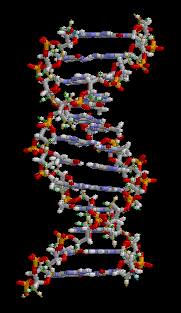
By getting information out of DNA about a person’s age, appearance and country of origin, we will be able to help the police identify a group of people of interest that they can then call in for questioning and DNA testing. Furthermore, being able to tell someone’s true age from their DNA can also be very useful in cases where someone’s legal treatment depends on whether or not they are adults or minors, like, for example, if they commit a crime.
Female scientists breaking stereotypes
I came across Soapbox Science in an email that went around my university last year, but at the time I was still in my first Ph.D. year trying to figure out this new chapter of my life, so I did not really look into it, but rather bookmarked the website.
During the next year however, when things started falling into place (admittedly I am still not 100% sure about what I am doing most of the time but I have come to terms with it!), I started following Soapbox Science and reading into articles written from all these amazing women trying to break the stereotypes in science and inspire young girls.
So, there it was, all these women fighting to make this world a more equal place, a place where a girl with a toy unicorn can be a bad-ass scientist if she wants to, and I was all for it. When the next call for speakers came up it was time for action!
My Soapbox Science talk
My talk was about DNA intelligence information, or what can DNA tell us about a person. Together with the audience we went behind the scenes of a murder investigation (spoiler alert!). With five suspects and just a tiny bit of DNA to help us out, we needed all the information we could get. Age, eye colour, hair colour and country of origin all came together to help us point the police towards the right person!
Together with my amazing friend, colleague and volunteer for the day, Federica, we picked a group of suspects that have both similarities and differences and are inspired from some of our favourite cartoon characters. I was on the look for a courage potion for the day (but in the end coffee helped..!).
Keeping an open mind
The very core of science is about keeping an open mind. This field, like everything else in life, cannot move forward without the flow of ideas, and is there a better way to get new ideas than by asking different people?
Our minds work in amazing ways that are so different for each and every one of us, so imagine what people from different backgrounds can do when they combine their brain power! It is only when everyone gets the chance to speak without prejudice or bias that we get the best combination of ideas that can move any field forward.
What if someone speaks a different language, what if they are small and girly or big and intimidating, what if they are from the north or the south and what if they have a Y chromosome or not? Why would any of these matter when their ideas can change this world for the better?
International conferences and collaborations
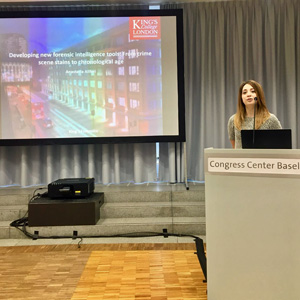
It is true that when you first think of science your mind does not go to adventures, but rather to an LED-lit squeaky-clean laboratory. In reality though, science is all about the flow and communication of ideas. Conferences and collaborations are essential for the progress of a scientific project because, in the end, two minds are better than one, so imagine a conference hall full of them!
Scientists figured this out a long time ago and, especially in small fields like forensics where everyone knows each other, conferences are getting more and more similar to family holiday reunions (occasional awkward uncle and fun cousins included!). In the end, even if you are not a field application scientist that has to travel around the world constantly to deliver trainings, you will undoubtedly have to share your research with other scientists across the world, so travelling is never out of the equation!
Coming up
Up next for me are two and a half years of Ph.D. life and a thesis write up that I am dreading! Having made the start with Soapbox Science, I am most definitely planning to continue with public engagement events and having a more active role in supporting women in science.
If all goes well with my Ph.D. (*trying not to panic*), my plan at the moment is to stay in research and hopefully get some good funding for a post-doctoral research position and see where that leads me. So, research, research and some more research, although if you ask me the same question in a couple of years, when I will be writing my thesis, I will probably tell you I want to become a baker!
https://twitter.com/anastasialiferi
DNA GIF image credit: By brian0918™ [Public domain], from Wikimedia Commons

